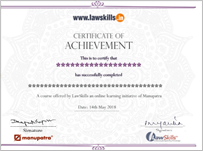Have general questions about LawSkills? You can find helpful information on LawSkills in our FAQ section.
Have a question about something specific? Contact LawSkills’ General Support Team directly for a quick and efficient response:
Please note: The LawSkills Support Team will address your queries in English. While we will do our best to address your enquiry in any language, our responses will be in English.
| Serial No. | Course Name | Text |
|---|---|---|
| 1 | General | Launch of LawSkills on 28th June 2017 |

In February 2012, the Supreme Court canceled 122 telecom licenses awarded to 16 Indian companies.
Aseervatham Achary, one of the top officers of the telecommunication department, decided to raise voice against the illegal activities happening within the department. Subsequently, he blew the whistle on the Telecom Minister A Raja's and DMK MP Kanimozhi attempt to grant the controversial licenses to the nine operators. He provided crucial documents and information to the CBI that led to unearthing of 2G scandal thereby risking his life to expose the scam.
The action was taken when it was established that majority of them had bribed senior government officials.
Consequently, a number of senior government officials as well as employees of the private sector were jailed in the aftermath of the scam. The scam was estimated to be $27bn – became widely known as the 2G-spectrum scam.
Whistle blowing is the act of drawing public notice, or the attention of an authority figure, to perceived wrongdoing, misconduct, unethical activity within public, private or third-sector organizations. Fraud, corruption, bullying, cover-ups, health and safety violation, and discrimination are common activities highlighted by whistleblowers.
Whistle blowing on internal malpractices and external threats is tremendously significant for the functioning and survival of organizations. The course aims to make the learners know about their accountability to blow the whistle and the protection given to whistleblowers.
In the course you will learn when and how to blow the whistle, and how whistleblowers are protected under the Indian law. This course intends to provide legally amenable guidance about whistle blowing and public interest disclosure. It aims to help learners understand their tasks and obligations when faced with improper conduct in the workplace.
After completing this course, you will be able to:


Level: Beginners
Language: English
Duration: 6 Months
EVALUATION METHOD
Progress will be tested by way of quizzes and assignments at the end of each Module. Learners must attempt the exam at the end of the course and secure at least 50% marks to obtain course certificate.
| S.No. | Title | Date | File | Edit | Delete |
|---|


